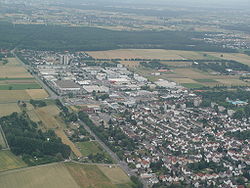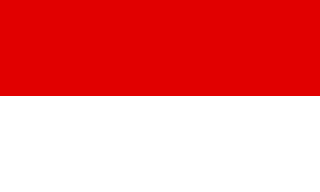
Hesse or Hessia, officially the State of Hesse, is a state in Germany. Its capital city is Wiesbaden, and the largest urban area is Frankfurt, which is also the country's principal financial centre. Two other major historic cities are Darmstadt and Kassel. With an area of 21,114.73 square kilometers and a population of over six million, it ranks seventh and fifth, respectively, among the sixteen German states. Frankfurt Rhine-Main, Germany's second-largest metropolitan area, is mainly located in Hesse.

Darmstadt is a city in the state of Hesse in Germany, located in the southern part of the Rhine-Main-Area. Darmstadt has around 160,000 inhabitants, making it the fourth largest city in the state of Hesse after Frankfurt am Main, Wiesbaden, and Kassel.
Offenbach is a Kreis (district) in the south of Hesse, Germany and is part of the Frankfurt/Rhine-Main Metropolitan Region. Neighbouring districts are Main-Kinzig, Aschaffenburg, Darmstadt-Dieburg, Groß-Gerau and the cities of Darmstadt, Frankfurt and Offenbach.
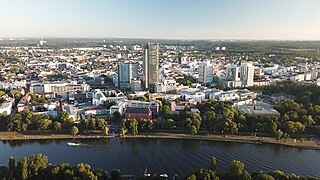
Offenbach am Main is a city in Hesse, Germany, on the left bank of the river Main. It borders Frankfurt and is part of the Frankfurt urban area and the larger Frankfurt Rhein-Main urban area. It has a population of 138,335.
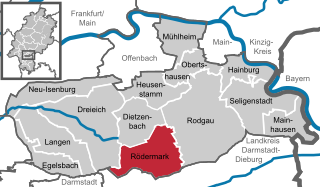
Rödermark is a town in the Offenbach district in the Regierungsbezirk of Darmstadt in Hesse, Germany, southeast of Frankfurt am Main and northeast of Darmstadt.

Obertshausen is a town in the Offenbach district in the Regierungsbezirk in the state of Hessen, Germany. It has around 24,000 inhabitants.
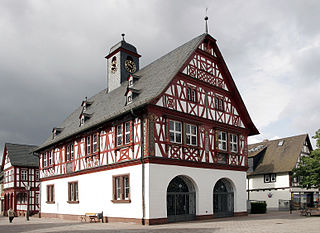
Groß-Gerau is the district seat of the Groß-Gerau district, lying in the southern Frankfurt Rhein-Main Region in Hesse, Germany, and serving as a hub for the surrounding area. In 1994, the town hosted the 34th Hessentag state festival.

Rodgau is a town in the Offenbach district in the Regierungsbezirk of Darmstadt in Hesse, Germany. It lies southeast of Frankfurt am Main in the Frankfurt Rhine Main Region and has the greatest population of any municipality in the Offenbach district. It came into being in 1979 when the greater community of Rodgau was raised to town, after having been formed through a merger of five formerly self-administering communities in the framework of municipal reform in Hesse in 1977. The current constituent communities’ history reaches back to the 8th century.

Hainburg is a municipality of just under 14,400 inhabitants in the Offenbach district in the Regierungsbezirk of Darmstadt in Hesse, Germany.

Heusenstamm is a town of over 18,000 people in the Offenbach district in the Regierungsbezirk of Darmstadt in Hesse, Germany.

Neu-Isenburg is a town in Germany, located in the Offenbach district of Hesse. It is part of the Frankfurt Rhein-Main urban area and has a population of 38,204 (2020). The town is known nowadays mainly for its regionally used shopping centre, the Isenburg-Zentrum (IZ), the Hugenottenhalle, the Hotel Kempinski Frankfurt, the Autokino Gravenbruch, the Sportpark, the Waldschwimmbad and its location near Frankfurt Airport.

Dreieich is a town in the Offenbach district in the Regierungsbezirk of Darmstadt in Hessen, Germany. The town is part of the Frankfurt Rhein-Main urban area and is located roughly 10 km (6.2 mi) south of downtown Frankfurt am Main. With a population of more than 40,000 it is the district’s second largest town.
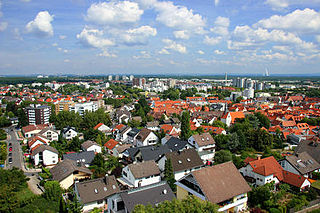
Dietzenbach is the seat of Offenbach district in the Regierungsbezirk of Darmstadt in Hesse, Germany and lies roughly 12 km southeast of Frankfurt am Main on the waterstream Bieber. Before the Second World War, the current town was a farming village with not quite 4,000 inhabitants. However, after the war, there was a considerable upswing in the population due to refugees settling in the community. From the 1970s onwards, Dietzenbach's population rose rapidly, reaching some 33,000 by 2006. Just under a third of the inhabitants have roots in more than a hundred nations outside Germany. Agricultural buildings are nowadays seldom seen in Dietzenbach.

Langen is a town of roughly 39,000 in the Offenbach district in the Regierungsbezirk of Darmstadt in Hesse, Germany. The town is between Darmstadt and Frankfurt am Main and part of the Frankfurt Rhein-Main urban area. Langen is headquarters to Deutsche Flugsicherung, and is also home to the Paul-Ehrlich-Institut, a Federal institute for the evaluation and supervision of sera and vaccines in Germany.

Mörfelden-Walldorf is a town in the Groß-Gerau district, situated in the Frankfurt Rhine-Main region in the federal state (Bundesland) Hesse, Germany.

Mühlheim am Main is a town of roughly 28,500 inhabitants on the Main’s left bank in the Offenbach district in the Regierungsbezirk of Darmstadt in Hesse, Germany. Its municipal area measures 20.67 km².
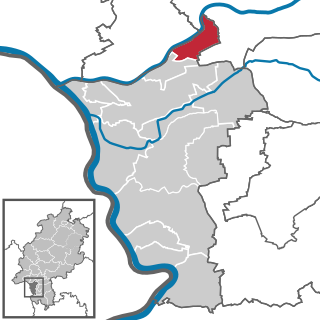
Kelsterbach is a town in Groß-Gerau district in Hessen, Germany and part of the Frankfurt Rhein-Main urban area. It is located on Frankfurt's southwestern outskirts at a bend on the left bank of the river Main, right where a small brook, called the Kelster joins the river.
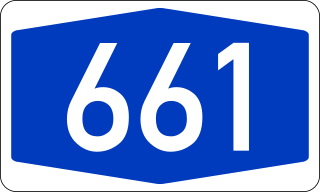
Bundesautobahn 661 - also called Osttangente Frankfurt or Taunusschnellweg - is a 40 km (25 mi) long Autobahn in Germany. It starts in Oberursel and goes along Bad Homburg, Frankfurt am Main, Offenbach am Main and Neu-Isenburg until it is ending in Egelsbach.
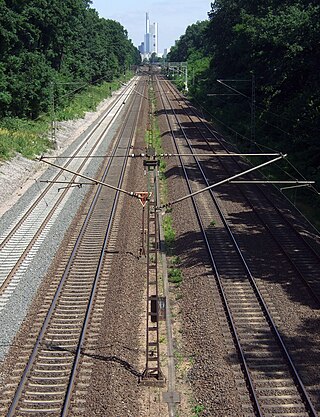
The Main-Neckar Railway is a main line railway west of the Odenwald in the Upper Rhine Plain of Germany that connects Frankfurt am Main to Heidelberg via Darmstadt, Bensheim and Weinheim. It was opened in 1846 and is one of the oldest railways in Germany.
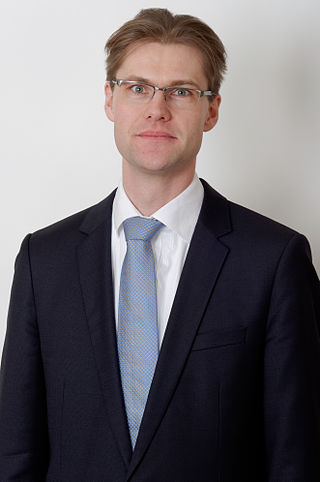
Hartmut Honka is a German conservative politician and Member of Parliament in the Landtag of Hesse.
